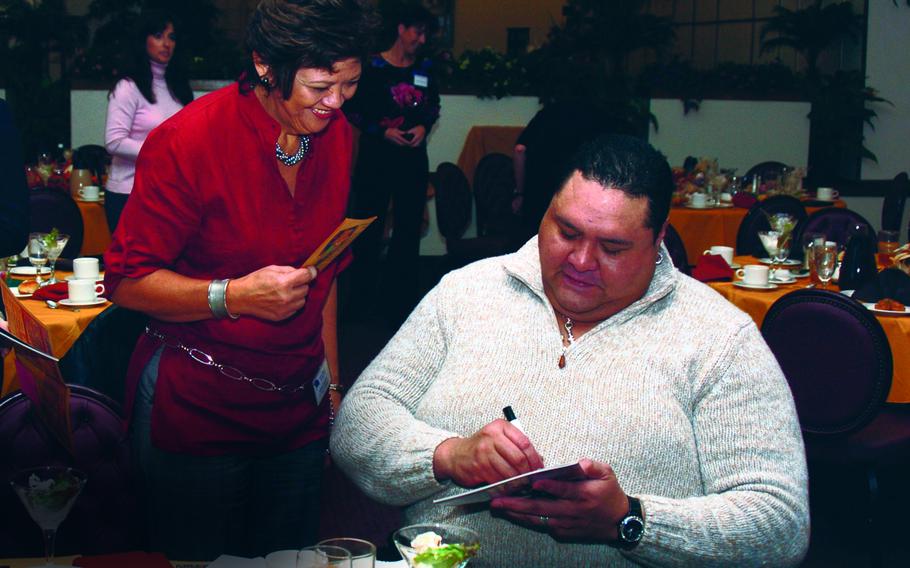
Chad Rowan, better known as legendary sumo wrestler Akebono, signs an autograph after speaking about sumo at the Officers' Club on Yokota Air Base, Japan, Nov. 6, 2007. (Stars and Stripes)
YOKOTA AIR BASE, Japan — Sumo legend Taro Akebono, 54, who died Wednesday of heart failure in Tokyo, was a familiar face to many members of the American military community in Japan.
The native Hawaiian who became a Japanese citizen in 1996 was a fixture at Yokota, an airlift hub in western Tokyo that serves as headquarters of U.S. Forces Japan.
Stars and Stripes chronicled his rise to becoming the first non-Japanese to attain the sport’s highest rank, yokozuna, in 1993.
Born Chad Rowan on the island of Oahu in 1969, he grew to 6-foot-8 and over 500 pounds in his prime.
He was recruited to sumo by Jesse Kuhaulua, another Hawaiian wrestler, and brought to Japan in the late 1980s. He wrestled out of Kuhaulua’s Azumazeki stable in Tokyo, and later served as a coach there.
Akebono became a yokozuna in January 1993. He earned 11 Emperor’s Cups, emblematic of winning a sumo grand tournament. He retired from sumo in 2001 and later competed in mixed martial arts and professional wrestling.
Akebono’s links to the U.S. military are through his Japanese-American wife, Christine Rowan, a 1989 graduate of Yokota High School and a civilian employee on the base.
The pair met briefly in the mid-1990s and reconnected at the New Sanno, a Tokyo hotel operated by the U.S. Navy, before their marriage in 1998, she told Stars and Stripes by phone Friday.
The friendly giant preferred informal settings, Rowan said. In public, “he had to be a certain way; he couldn’t be himself.”
In more normal situations — a family gathering or birthday party — he liked to be around people who spoke his language, “where he could relax and just be Chad,” she said. “He had a lot of friends in the military with whom he would spend time.”
Akebono could often be seen working out at Yokota’s Samurai Fitness Center and in the gym at Akasaka Press Center, also known as Hardy Barracks, Stars and Stripes’ headquarters in Tokyo. Locker No. 23 is still assigned to him there.
He was a regular at Yokota’s goodwill gatherings, such as the Special Olympics and events surrounding Asian American and Pacific Islander Heritage Month.
The star could also be spotted at Yokota volleyball and basketball games involving his children — Caitlyn, Cody and Connor — who all attended Yokota High.
He would not hesitate to correct his kids if something happened on the court, Rowan said.
“As Akebono and in sumo, Chad had learned to respect the sumo ring, the equipment, the officials and the sport itself,” she said.
When his daughter complained about a referee’s call, he came down to the court and chastised her, saying, ‘Don’t ever do that again,’” Rowan recalled.
“In his sport, he was always respectful, and he wanted his kids to do the same,” she said. “She learned from that moment.”
Akebono’s death was marked by USFJ and U.S. Ambassador to Japan Rahm Emanuel, who sent condolences to fans, family and friends.
“We join all sumo fans today in expressing our heartfelt condolences on the passing of Former Sumo Grand Champion Akebono,” USFJ posted on its official X account the day after his death. “A true champion and barrier breaker for becoming the first foreign-born grand champion Yokozuna.”
Emanuel, in an X post that day, described Akebono as a giant in the world of sumo, a proud Hawaiian and a bridge between the U.S. and Japan who opened the door for other foreign wrestlers to find success in the sport.
“Throughout his 35 years in Japan, Akebono strengthened the cultural ties between the United States and his adopted homeland by uniting us all through sport,” he said.